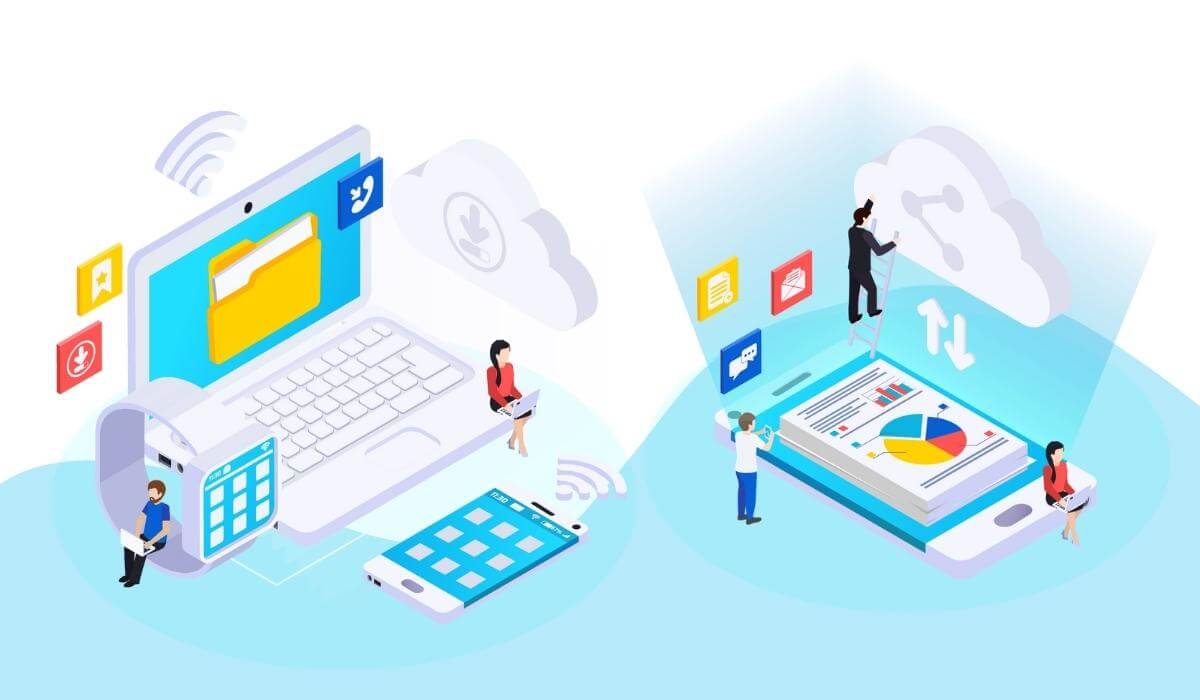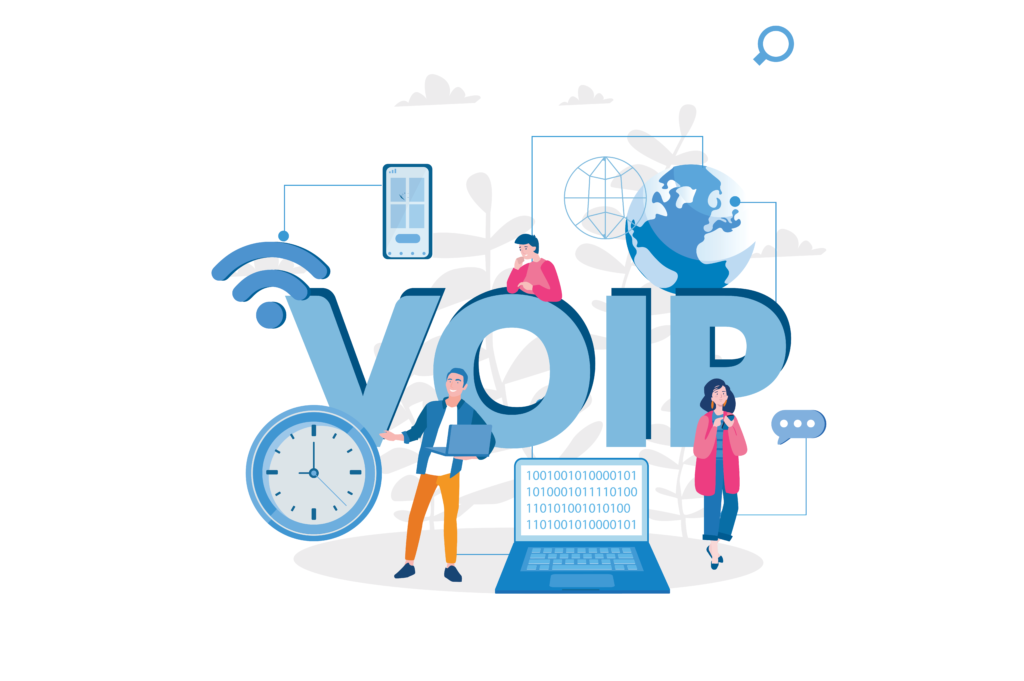Table of Contents
Even though the Internet provides convenient access to businesses, people continue to make and receive conventional phone calls. And for good reason—it’s very convenient.
Although you might be familiar with the term “VoIP,” perhaps you are not fully aware of the technology’s full potential. These four letters stand for a technology that has had a profound impact on the way businesses and consumers communicate over the telephone.
According to Statista, over 35 million VoIP lines were added by companies in the United States between 2010 and 2018, increasing the total number of VoIP lines in the nation to 41.6 million in eight years.
Residential VoIP lines, meanwhile, grew from around 28 million to 76.6 million within the same period. Businesses had a far greater percentage increase in VoIP use, although residential usage remained below business levels.
This article describes what a VoIP number is, how it works, the advantages it provides, and how it differs from other kinds of phone numbers.
What Is a VoIP Phone System?

Voice over Internet protocol (VoIP), sometimes referred to as IP telephony, is a technology that enables you to transmit voice messages and other forms of communication via the Internet.
A large number of organizations are turning away from the plain old telephone service (POTS), also known as the public switched telephone network (PSTN), because of the several benefits VoIP brings. In a VoIP phone system, voice signals are converted into digital data packets, which are then sent via the internet through a router to the recipient.
In the context of VoIP calls, this refers to any sort of communication that is carried out via the Internet, such as text messages, emails, or chat sessions. Virtual private branch exchange (VPBX) systems with multiple phone lines can provide all of the features traditional PBX systems with multiple phone lines do, such as voicemail, call forwarding, call waiting, caller ID, conference calling, and more but with a lower price tag.
How Are VoIP Phone Systems Commonly Used?

In most cases, a traditional phone line only allows you to chat with one person at a time. VoIP enables many conversations, including conference and group calls, which is a significant benefit for many firms, particularly small and medium-sized enterprises. Employees, managers, and business colleagues find using VoIP connections simplifies interactions with one another and communications with customers.
Businesses use VoIP services, in the same way, individuals do – to communicate with one another for free or at rates much reduced from traditional carriers, as long as they are connected to the Internet.
Other VoIP services allow you to use your current phones that are already linked to the Internet to make limitless calls at a lesser cost than traditional telephone companies’ per-minute rates. These service providers give a variety of packages from which to choose, many of which may be suitable for your company’s size, its business requirements, and your financial situation.
What Is a VoIP Number?

Traditionally, voice calls required the use of a landline and phones attached to a particular place, resulting in the creation of an area code. VoIP (Voice over Internet Protocol) technology makes it possible to connect to the Internet and use common devices such as a smartphone or tablet to get voice phone service from anywhere, a major driver of its popularity.
These virtual calls can be made using a variety of devices, including laptops, desktop computers, and landlines (using an appropriate converter).
However, rather than being assigned to a single device, such as your smartphone, the number is instead assigned to a certain person or “user.”
Basically, VoIP is the same as connecting your landline to the internet and unlocking a whole new world of possibilities in terms of things like charge-free long-distance calls and sophisticated call-forwarding services, among other services.
The magic of VoIP allows someone in San Francisco to contact a person in Boston as if it were just another local call!
However, condensing the concept of VoIP to a simple area-code magic trick does not give full credit to the service’s capabilities. Additional capabilities are tacked onto virtual phone numbers, making them a valuable asset for organizations and people with specialized communications requirements.
What Is a VoIP Number and How Do I Know if I Need One?

If your existing phone system is slowing down your company’s operations, think about how much of a difference it could make if you invested in a VoIP phone system.
Despite the abundance of communication channels accessible today, a cloud-based business phone system continues to be the backbone of the majority of firms’ operations. To receive consumer phone calls, establishments such as restaurants, doctors’ offices, and retail shops, for example, still rely on a central phone system.
In terms of VoIP, the first principle to remember is that, like everything else, IP-based, these technologies are intended to be self-managed. This implies that it is your responsibility to bring about change, and once you do, you will find yourself in a whole different world.
This may seem to be a difficult task, but the information in these guidelines has been thoroughly researched and developed to assist you in making the shift to VoIP. Unless your legacy phone system collapses unexpectedly, you should be on the watch for signs that a VoIP phone system will be a more cost-effective choice in the future.
How Much Does a VoIP Number Cost?
The cost of a business phone system will almost certainly be the most important factor in any choice your company makes about telephone service and infrastructure, but it is not the only indicator that a switch to VoIP will benefit your company.
If the math adds up and everything else is nearly equal, VoIP might be a straightforward option. However, the process of “adding up” can be rather complicated and therefore needs more examination.
Assuming, for the time, that your previous system has been fully paid for, it would be a mistake for you to think that there are no further fees beyond the service provided by your telecom carrier. Apart from the ongoing maintenance expenses, you should be aware that your telecom provider may not be eager for you to make the transition to IP-based network infrastructure.
No One Is Using the Desk Phone
The use and behavior of employees are likely to be the most telling sign of the need for change, but only if you pay attention to what these indicators are telling you. Although human nature is immensely diverse, those obsessed with technological advancement have the propensity to perceive everything through a technologically oriented prism (or lens).
Businesses that think and operate in this manner will miss the most apparent indications of what is best simply because they are not searching in the appropriate areas. There is a significant difference between seeing and observing, and the journey to knowledge starts with the identification of a problem.
Even if legacy phone systems continue to operate in the same manner as they did in the past, in today’s world of IP-based communications, legacy systems are unable to interact with other systems, diminishing their utility to employees.
Employees may use the desk phone when they are completely certain that the other person will be able to receive their call, but this is more of an exception than the norm. Simply expressed, they find that alternative techniques and applications better meet their requirements.
Mobile devices offer substantial value in instances where employees are spending less time at their desks and the office. The functionality of older legacy phone systems simply cannot compete in terms of today’s mobile handsets.
Productivity Is Being Hampered by an Outdated Telephone System
Voice over IP (VoIP) has emerged as a significant force for organizations in terms of lowering telephone costs and increasing productivity, despite legitimate worries about the economic case for maintaining a dedicated network and its accompanying equipment. A variety of IP-based alternatives are easily accessible.
Aside from the financial benefits of VOIP, other advantages also need consideration, such as the benefits of consolidating voice and data traffic into a single network infrastructure.
In addition to several cost reductions, switching to a VoIP system can bring your company greater operational efficiency – which would be much appreciated by any IT department. Since VoIP service is just another data application, it can be readily integrated into the LAN, optimizing every part of telephony in the process.
The Value of Voice Is Greater Than the Value of Data
Overall, the most significant lesson from this study is that workers talk more with one another as internet connections became more prevalent. Employees now tend to be heavily reliant on text and chat, but this does not necessarily imply that there is a replacement effect at play. The human voice supplies more meaning to words.
Direct verbal contact is usually the preferred mode of communication for negotiation, explanations, instruction, and other delicate forms of interaction.
However, internet availability speeds up simple forms of communication. You don’t have to speak to a person to make a simple request or verify that a task was completed. For these transactions, text or chat is more efficient. Any business should be sure that multiple modes of communication are available. These facilitate a vast increase in both verbal and written communication. Clearer and more timely communication brings increased productivity.
As long as these technologies result in measurable business benefits, everyone is pleased. However, when the cost is removed from the equation, the adoption of these tools becomes more rapid.
Vendor Landscape
There has never been a shortage of VoIP vendors. And now the scene has gotten more cluttered.
Even so, legacy suppliers continue to produce the bulk of their income from traditional phones, while VoIP continues to generate the vast majority of new business.
When it comes to telephony, organizations often have a long-term connection with a certain provider, which is a hurdle in itself. VoIP options were probably not available when you were last in the market for a new phone system. The landscape has undoubtedly changed since that time. Many of the same firms are still present, but their products and services are no longer the same.
You may be content to keep your current system running. If it is completely paid for, this is a simple stance to defend. Especially for small businesses, saving money is paramount, and if a company’s phone system is in perfect working condition, there is no incentive to upgrade.
However, it’s difficult to ignore what’s happening with suppliers and technology in general. In the same way that VoIP decreases telephone expenses for your company, it also lowers the barriers to entry for new VoIP suppliers in the marketplace.
What Are the Advantages and Disadvantages of VoIP Phone Systems?

Advantages
1. Cost-cutting Solutions
If you’re fed up with high phone costs, VoIP is a fantastic solution to consider. By using a VoIP service, you may reduce your monthly phone expenses by as much as 50 percent.
Other elements that influence the cost include the kind of VoIP service you pick, the cost of gear (if any), your service provider, and any other ancillary costs. For example, with a cloud-based system, there is no need to purchase and install gear before it can be used.
To use this service, you just need an internet connection and a compatible device. You can sign up for services that will help your business. For instance, at the very minimum, you probably want unlimited long-distance calling at a reasonable monthly fee using cloud-based VoIP solutions such as 8×8 Express. International calls to nations in Europe and North America are often supported by these services.
When you sign up for a service, you usually get the added benefits of services through extra channels such as videoconferencing, instant messaging, and screen sharing, among others. With these, you can forward calls to anybody or any place. Even if you don’t think you will use some of these features, you can often keep them in your service for a time just to see whether you use them. If not, simply negotiate with the provider to remove them and lower your costs.
2. Accessibility
One of the most significant benefits of using a hosted VoIP service is the flexibility to make calls from any location at any time, as long as you have a reliable internet connection.
The ability to access information when on the move, at a client location, or while traveling for work is quite beneficial. Using the smartphone app provided by your VoIP operator, you can carry your business line with you wherever you go.
If you are unable to accept calls, you can transfer them to an available colleague or employee. You can even choose to have your voicemails sent to you through email.
Remote accessibility allows firms to remain flexible in the face of continued mobile workforce growth and increased numbers of remote workers. With VoIP, your employees can stay productive and connected regardless of where they are.
3. Performance in Terms of Quality
High-quality sound and connections are almost guaranteed as long as your internet connection is dependable, and you have enough bandwidth. When compared to regular telephone service, it should be at least as good as, if not better.
With VoIP, there is no longer a need to worry about long-distance conversations sounding crackly or muffled. Distance is not a factor in the clarity of sound because no physical infrastructure is involved.
With VoIP technology, you can make and receive many calls at the same time without sacrificing sound quality.
Using a virtual phone number helps improve your performance because you can use the same number wherever you go, thereby giving clients continuity and the reassurance of a stable connection. You can also count on being able to contact people exactly when you need to do so – no matter where you are or how good or bad the local telephone service is.
If your company relocates, even if you move to a foreign nation, you can usually maintain the same phone number as before the move.
4. Additional Functionality
Many conventional or alternative telephony business models are based on upselling extra functions to clients who are looking for a better voice call experience in exchange for a higher price. The price of connection may quickly go up as a result of this.
Although adding features like video conferencing, call forwarding, caller-ID services, call waiting, and three-way calling can be very advantageous for both small and large businesses of certain types, they might also be prohibitively costly.
With the usual rate and call provision, VoIP provides a wide range of extra capabilities, such as those mentioned above. You do not need to provide everything at the outset. You have the freedom to pick and choose the functions you need, and you can always add more as time goes on or subtract what you are not using.
VoIP makes phone systems incredibly scalable, so it is a compelling way to communicate for firms that want to expand. Besides allowing users to simultaneously talk and send data (documents and photos), VoIP makes collaborative working while at a distance far more convenient for everyone involved.
Remote and home working are more popular since the outbreak of the coronavirus, and these features will continue to be of significance for the foreseeable future when it comes to remaining in contact with workers, colleagues, and customers all over the globe.
Disadvantages
1. Reliable Internet Connection Required
The quality of your VoIP service is limited by the quality of your internet connection. If you have a limited broadband width, the quality of your service will inevitably degrade.
VoIP does not use nearly as much bandwidth as you might expect. When using VoIP devices, they must have a low latency experience on your network. Each device should be capable of uploading data at a rate of at least 100 kbps. Ping and jitter, which are measurements of latency and stability of your internet connection, should be less than 70ms for a decent connection to be considered excellent.
The quantity of bandwidth your business will need will be decided by the number of concurrent calls that you want to make on the network. The most accurate approach to assess this is by conducting a bandwidth test of your existing network.
2. Latency and Jitter
Aside from speed, any internet-based device can experience latency and jitter problems that can occur while using a connection.
“Data packets” are little pieces of data sent with each communication carried out over the internet, whether it be an email, a video, or an audio message. Each of these packets is reassembled at its final destination to reconstruct the original message that was sent.
Latency and jitter occur when these data packets experience delays in transmission or are incorrectly reassembled after the reception. It’s possible that the problem is not with your network at all; large internet backbones adjust data pathways to transmit traffic reliably and on the shortest path to a destination. These modifications are carried out automatically, with no intervention on your behalf.
3. Emergency Calls Can Only Be Tracked to a Limited Extent
The last disadvantage of VoIP is the ability to monitor your whereabouts. It is difficult for third parties to determine where a VoIP call originates because of the portability and accessibility of VoIP technology.
The calls originate from an IP address that cannot be tracked since there is no GPS data or mobile tower information available. Despite the fact that 99% of callers do not need this information, it can cause a problem for emergency services such as 911. In an emergency, you’ll need to verbally transmit your location.
What Other Options Are There Other Than VoIP?

VoIP phone services are commonly supplied as an add-on service by the majority of Internet service providers and deliver the same functional ability as a regular phone system. A few viable options exist for folks who do not want to use VoIP through their utility provider or who do not have access to it due to lack of availability or unstable internet connections.
If you want to create a baseline for your requirements, ask yourself the following question: “Which features are most essential to me right now?”
After determining your starting place, you should ask yourself, “What characteristics will be significant to me in the next year?”
When investing in technology such as VoIP, it is important to look forward to guaranteeing that you are not forced to repeat the same process one, two, or even three years down the road. Finding a solution that enables you to develop, add users, and take advantage of additional features is critical since switching is not always simple or inexpensive.
Our recently published in-depth analysis of the cloud-based phone system’s pros and cons should help you in making the right decision for your company.





